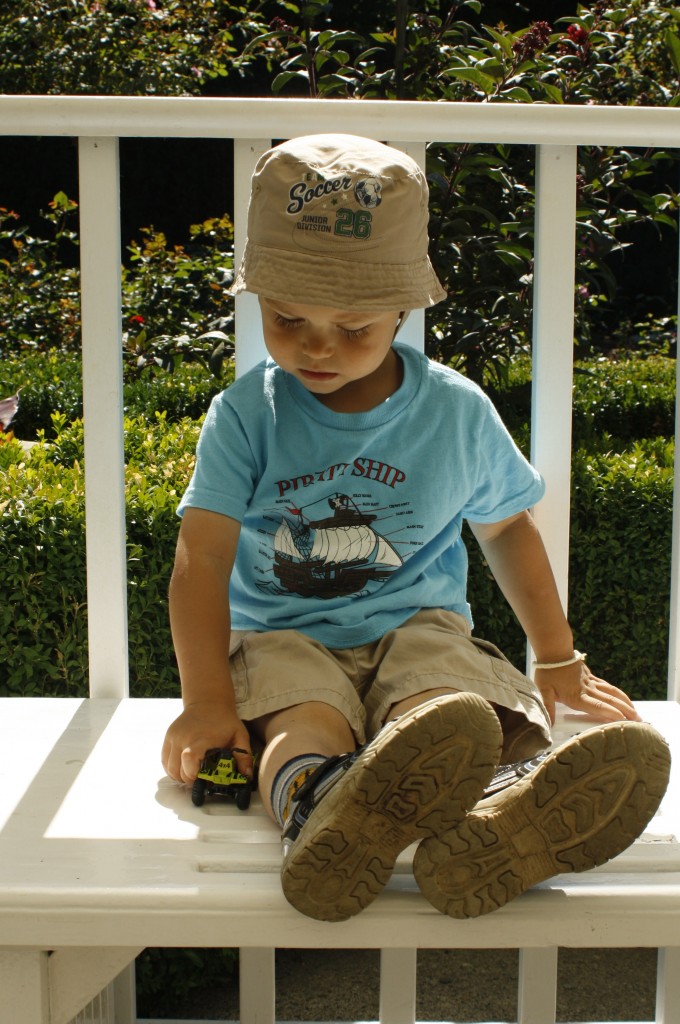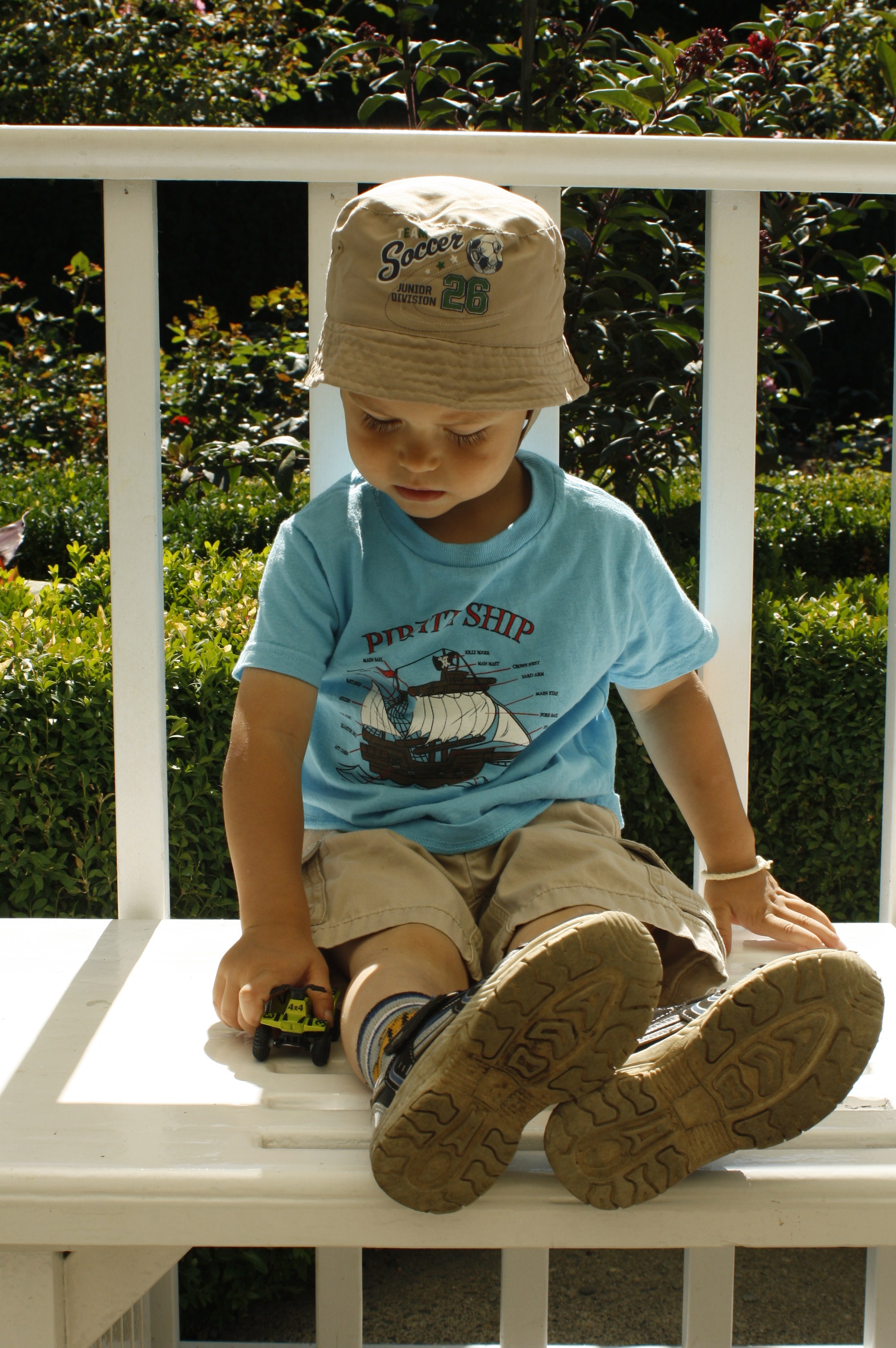If you have a child who could be considered “high needs” – as I do – you’ll love this interview, just a little bit more. For more from Wendy, be sure to visit her blog, www.highneedsattachment.wordpress.com.

1. Tell us a bit about your family
I have been married for five years to Kevin and we have a 3 1/2 year old son named Isaac. We enjoy being active and outdoors (camping, hiking, etc), reading, doing crafts, cooking, and playing games together. In terms of individual interests, Kevin is involved in a weekly curling league, I have recently started Pilates classes, and Isaac takes a music class. We attend a weekly church service, and our faith plays a central role in our values and meaning of life.
2. Have you always known you wanted to homeschool? / What made you decide to forgo preschool?
We talked about homeschooling before getting married, and at the time were interested primarily due to concerns about the values being taught in public schools, as well as some concerns with bullying and the classroom environment. After Isaac was born, I began to see how central a role attachment plays in development, and grew uncomfortable with sending my child off to full day kindergarten at the young age of 5, when attachment needs are still predominant.
As Isaac reached his toddler and preschool years, I repeatedly saw how natural and spontaneous learning was, and how my own agendas with teaching certain things at certain times actually interfered with his learning process. Furthermore, as Isaac is quite sensitive and intense, I began having concerns with how well his temperament would fit within the constraints of a typical classroom.
3. What is your favorite thing about homeschooling?
It brings me incredible joy to be able to witness the passion for learning that Isaac has, and the intensity of his curiosity. When guided by his interests, the possibilities seem limitless, and I love sharing in his excitement when he discovers something new, or masters a new skill.
4. The hardest thing?
The thing I struggle the most with right now is exhaustion. Because of his age, temperament, and my own introverted nature, I can sometimes get very drained. Kevin is a very supportive husband / father though, and this helps tremendously.
5. Did you do anything to prepare for “school” this year?
Since Isaac is still quite young, we did not really consider doing anything to prepare for the school year. When he is of school age, I am not sure if we will really follow a school year calendar, or take more of a year round approach, with times of rest and vacation throughout.
6. Has your child ever asked to go to school?
Isaac is too young to really understand what school is, although he seems curious about it when we read about it. We are not opposed to him attending school at some point; however many factors would need to be considered when / if that issue arises.
7. Do you prescribe to a particular homeschooling philosophy?
Not exactly, but I resonate with unschooling philosophy, as well as Montessori principles. I have been doing some training in the attachment-developmental approach (Dr. Gordon Neufeld), and am finding that many of these concepts help me to understand the learning process.
For example, Dr. Neufeld talks about the emergent process – that of becoming one’s own person, capable of one’s own thoughts /feelings, experiences and attachments. Children are not born emergent, but with the right conditions, can grow to become highly emergent beings – interested and curious, self-directed, creative, rarely bored, full of vitality, and responsible. Highly emergent children would therefore benefit from a fairly non-directive approach, with parent as supporter and facilitator. Non-emergent children, however, may need more structure and direction, as they would have less initiative on their own.
So I suppose in terms of a homeschooling philosophy, I would tend to focus more on providing the conditions to support the emergent process (secure attachment), and would ideally vary my approach (more or less structure / directiveness) depending on the developmental phase of my child.
8. Do you use a particular curriculum? Any recommendations?
I have not looked into curriculums, but would be interested in hearing others’ experiences with various materials.
9. What does a typical day look like at your house?
We tend to have a general flow to our days, but not a real set routine. We usually wake around 8am, followed by breakfast, then playtime / reading time. Isaac seems to function best by being able to snack throughout the day, so lunch is not a set event. He takes an afternoon nap about one quarter of the time, but on non-nap days we have some quiet time or reading time. Dinner is usually early when Kevin gets home from work about 4:30, and after dinner is playtime / activities, followed by bedtime around 8pm.
Isaac is taking a music class on Mondays, on Tuesday we attend a Moms group, on Thursday we go to storytime at the library, and on Saturday mornings my husband takes him out. These activities seem to provide a good flow to the week, and help to give him things to expect and look forward to.
10. What is your best homeschooling tip?
I would love to hear others’ tips so when we get closer to school age, we have more ideas.
11. As a homeschooling family, what is the one item you couldn’t do without?
Books – we spend hours reading together and frequent the library. I’m not sure what I’d do without such a great library system to tap into.
12. Any final thoughts?
I’m grateful to have learned about homeschooling and to have met others who share passion for home learning. I’m excited to be embarking on a journey of lifelong learning.
Thank you, Wendy for sharing your inspiring words!





My son is very intense, too. From the age of 6 month to about age 4, he would regularly wake up crying about 6-7 times a night, even sleeping right next to us. He has intense swings of emotions, still, at almost age 6. He likes to stay up later, sometimes until 11:00 p.m.and is usually up by 7:00 in the morning. He and his sister stopped taking regular naps before they turned two and a half. He has a hard time sitting down to eat, and needs lots and lots of time for running and climbing. He would do awful in a school situation.
His twins sister is more laid back but has her own special needs. She started reading really well by the age of 3 and needs lots of time to talk and ask questions of others. She’s very curious and loves to learn factual things.
So I understand where you’re coming from with being very exhauster. Sometimes my husband is out of town for three or four nights, and it’s all I can do to keep it together by the time he gets home!